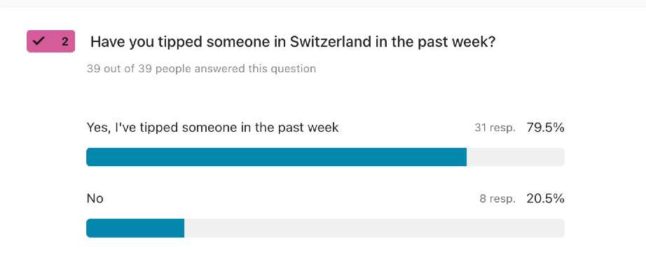Tipping culture in Switzerland can be difficult to work out.
That’s certainly the case for tourists, but even residents have told us it is difficult to determine exactly when to tip – and when not to.
To get a better idea, we reached out to our readers to ask for their feelings on the necessity of tipping and how to navigate the complex web of cultural rules surrounding tipping culture.
The survey, launched in July, saw a good response, with 39 people getting back to us to have their say.
Here’s their top tips on tipping in Switzerland.
But first, what do the officials say?
Switzerland Tourism officially says that visitors shouldn’t worry about tipping, but should only do so if they want to.
In their advice on tipping, they write “You never have to worry about tipping in Switzerland, as tips are included in the price. You can, however, add a smile to the face of someone who has provided good service by rounding up to the nearest franc or round figure.”
Swiss news outlet 20 Minutes reports that ‘rounding up’ to the closest franc or five francs is the best approach.
Four out of five tip regularly
To get an idea of how widespread tipping truly is, we asked our readers to tell us if they’ve tipped someone in the past week.
Four in five respondents – 79.5 percent – told us they did so, showing that tipping regularly is by far and away the done thing in the Alpine Republic.

People from each major Swiss linguistic region told us they tipped regularly, showing that there is at least some consistency in Switzerland when it comes to tipping.
Of the responses we received however there was a wide variety of opinions – even among those who tip (and of course those who do not).
‘I always tip’
The majority of respondents told us they tip for good service, showing that tips are not a foregone conclusion in Switzerland (unlike in the United States).
Shelly, who lives in Luzern, said the Swiss did not tip enough and that she tipped both “as a matter of principle and (for) good service”.
While we didn’t ask everyone for their nationality, Americans and Canadians seemed the most willing to tip – a reflection of those countries’ strong tipping culture.
American Sofia says she tips regularly, although slightly less than what she would in the US.
“I often tip at restaurants, especially if it’s a place I go to often, as a way of saying thanks. It’s often a smaller tip than what I give at home in the USA, though, given higher wages here.”
American Amanda said she prefers the Swiss system.
“I think it’s good to recognise good service but not to feel obliged. The American culture is awful and makes you feel harassed and resentful. I like to leave 10 per cent”
‘I tip – but it’s not so clear to me’
While many said they are happy to tip, the exact amount they should tip wasn’t clear to them.
One reader from Vaud said she feels tipping is more expected in the present day.
Unfortunately, we can’t give you concrete advice on tipping in Switzerland, other than it will be appreciated but not expected in the most cases.
Generally speaking, service charges can be included into your bill. In that case, tipping isn’t necessary unless you really want to highlight how pleased you are.
Giving a tip of around ten percent seems to be the norm in Switzerland for restaurants and in some cases for bars and barbers.
Martin said even the Swiss aren’t exactly sure when to tip.
“In a restaurant or bar with a waitress I do tip as a thank you for not ignoring me and being polite during providing these services.”
“But to be honest I’m very confused from how much is a good amount and whether I should tip at all as everyone is telling me something else (even Swiss born).
Many in Switzerland – particularly in the French-speaking part of the country – ‘round up’ with their tips, meaning if a coffee costs CHF3.70, they’ll pay 4 and so on.
Of course this gets difficult the more you pay – saying to a waiter to round a bill of CHF123.70 up to CHF124 is pretty cheeky – but you can roughly use a five percent figure to round up.
So if the bill costs CHF15.40, rounding up to CHF16 will be slightly more than five percent, for instance.
Alexey, in Zurich, said he rounds up “around five to ten percent in restaurants almost all the time”.
Another reader from Basel supported the idea of rounding up, as did Aaron in Bern.
‘I never tip’
One reader, from Basel who perhaps unsurprisingly declined to give his or her name, said he or she didn’t tip because it supports an “unwritten tipping culture”.
KT, from Bern, says tipping is less necessary in Switzerland than the US as Swiss workers are paid more.
“In the US I know waiters are paid poorly and depend on tips for their survival so I tip a minimum of 15% and up to 25% for excellent service.”
“Here, I know waiters are paid a living wage and benefits, and so I tip up to 5% for service.”
Daniel, from Zurich, said not only did he not like to tip but he objected to a service fee being charged automatically as it didn’t give him the right too withdraw his tip if the service wasn’t good.
“I find it weird when they charge a “service fee”. The price of the meal in a restaurant factors in the service. Charging this fee instead of the tip takes away my freedom to reward excellent service.”





 Please whitelist us to continue reading.
Please whitelist us to continue reading.
Member comments